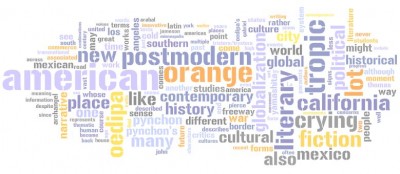Lately I’ve been wondering how to use Jane McGonigal’s Zen Scavenger Hunt idea in my teaching. A Zen Scavenger Hunt is essentially a reversed-engineered scavenger hunt. The hunters go out and find ten or or so items and only afterward do they receive the list of the items they’re supposed to be scavenging for. The participants have to improvise a series of hacks and demonstrations to prove that their items perfectly match the list.
The most faithful pedagogical analog to a Zen Scavenger Hunt might be having students write about anything using any format or style, and then give them the question they were supposed to be answering. The students next have to persuade me (and their classmates) that their essays do indeed answer the question, perhaps via footnotes or annotations.
The bulk of creative and critical work on the students’ part comes in at the second, performative level, in the rhetorical act of proving by whatever means necessary that their essays match — and in fact have always matched — my question.
A less faithful, though perhaps more intriguing possibility for introducing the same kind of backwards-modding into student work might involve using Wordle. I can imagine students writing (though I am pedagogically opposed to overreliance on such writing) a typical essay, say an analysis of the failure of cognitive mapping in Karen Tei Yamashita’s Tropic of Orange. They feed their essay into Wordle, and then other students must recreate the argument of the original student essay based on the Wordle-produced word cloud.
Or, in a variation of this assignment, the professor creates a Wordle cloud out of a scholarly essay, and the students work collaboratively to reconstruct the original publication. So, here’s a word cloud generated from Rachel Adam’s essay in Twentieth Century Literature 53.3 (2007) on Tropic of Orange, “The Ends of American, the Ends of Postmodernism” (larger version):
Could a group of students reconstruct an essay out of this word cloud? And then persuade me and their classmates, through an overlay of textual and spoken improvisation, that their new essay is in fact a faithful recreation of the original?
We’re in Borges territory here, but it’s someplace I think students need to spend more time.

[…] SAMPLE REALITY · Zen Scavenger Essay Writing "A Zen Scavenger Hunt is essentially a reversed-engineered scavenger hunt. The hunters go out and find ten or or so items and only afterward do they receive the list of the items they’re supposed to be scavenging for. The participants have to improvise a series of hacks and demonstrations to prove that their items perfectly match the list." (tags: games pedagogy creativity) […]
What a cool idea – an perfectly timed I think. I teach management and started, quite impulsively, a science fiction account of an new company Xoozya as a vehicle for accepting Jane McGonigle’s challenge – to make work that is as good as games.
I’m making it up as the story as I go, as a way of exercsing my imagineation and finding it harder than I expected.
So how about a Zen Scavenger Hunt as an induction tool! Thanks!